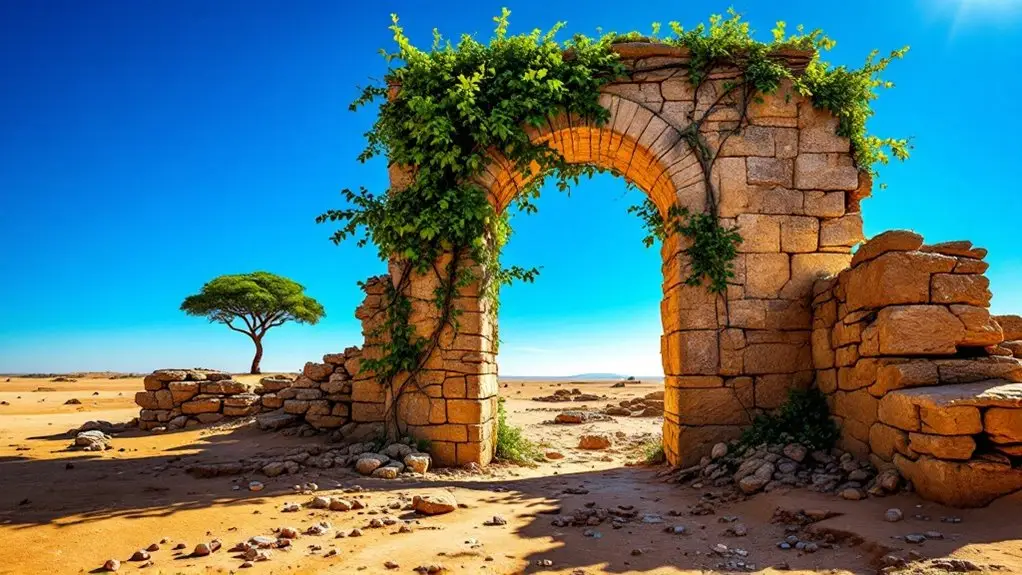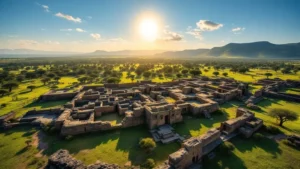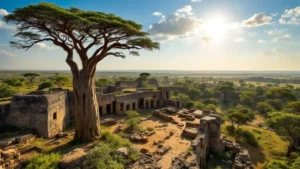When you stand before the towering walls of Great Zimbabwe, you can't help but feel the weight of history that echoes through its stones. Yet, many choose to overlook such monumental sites, missing the chance to connect with the narratives that shaped entire civilizations. Ignoring these ruins isn't just an oversight; it strips communities of their identity and diminishes our understanding of global history. What might we lose if we continue on this path of neglect?
Key Takeaways
- Ignoring Africa's ruins perpetuates a disconnect between communities and their heritage, undermining cultural identity and pride.
- Ancient ruins offer educational potential, enhancing understanding of Africa's diverse historical narratives and global significance.
- Preservation of ruins fosters local empowerment, promoting sustainable conservation efforts through community engagement.
- Neglecting these sites undermines economic opportunities, as heritage tourism can stimulate local economies and create jobs.
- Ongoing archaeological discoveries challenge misconceptions about African civilizations, emphasizing their innovation and architectural sophistication.
Misconceptions About African Architecture
Many people mistakenly believe that Africa's architectural achievements are primarily confined to ancient Egypt, overlooking the continent's vast and diverse architectural heritage. This narrow view neglects the remarkable structures found throughout Africa, particularly in regions like West Africa. Here, cities were meticulously constructed using adobe and wood, showcasing a unique approach to urban development.
The notion that only stone structures signify sophistication fails to recognize that many African cities, including those in ancient Egypt, primarily utilized materials like mud-brick and wood. Significant sites such as Great Zimbabwe and the Kilwa Sultanate illustrate extensive urban planning and thriving trade networks, highlighting the architectural prowess of African civilizations beyond the Nile.
Moreover, unique styles, like the rock-hewn churches in Lalibela, Ethiopia, and the impressive mosques in Mali and Niger, reveal the rich cultural influences shaping African architecture.
Unfortunately, many of these ancient structures face neglect and erosion. Acknowledging and preserving Africa's architectural heritage is essential, not just for historical accuracy but to combat misconceptions that persist in Western narratives.
Architectural Styles Across Africa
Across Africa, architectural styles reveal a tapestry of cultural richness and creativity shaped by diverse environments and histories. Each region tells a unique story through its structures.
For instance, the distinctive mosque designs in Sahelian architecture, particularly in Mali and Niger, showcase the influence of Islamic traditions intertwined with local craftsmanship. In the forests of Ghana, Ashanti houses boast large thatched roofs, meticulously designed to endure heavy rainfall—an adaptation rooted in the region's climate.
Traveling to Benin City, you'll encounter walls recognized as some of the largest earthworks in the world, a demonstration of the engineering prowess of the Benin civilization.
Meanwhile, the rock-hewn churches in Lalibela, Ethiopia, exemplify how spirituality and artistry blend seamlessly, drawing admiration for their intricate designs and historical significance.
Great Zimbabwe stands as a monumental representation of pre-colonial architectural sophistication. With over 200 identified structures, it showcases extensive urban planning and trade connections that underpin African history.
Key Historical Sites to Explore
Nestled within Africa's vast landscapes are historical sites that not only showcase architectural brilliance but also encapsulate the continent's rich cultural narratives.
Exploring these key locations in sub-Saharan Africa reveals a tapestry of historical significance that can deepen your understanding of the region's past.
- Great Zimbabwe: This ancient city, known for its impressive stone structures, was a major center for trade and culture from the 11th to 15th centuries.
- Lalibela: The rock-hewn churches of Ethiopia, carved in the 12th century, exemplify the architectural ingenuity of the Aksumite civilization and are recognized as a UNESCO World Heritage site.
- Kingdom of Kush: The ruins in modern-day Sudan, featuring over 300 pyramids, highlight the area's historical significance and its conquest of Egypt during the 8th century BC.
- Timbuktu: This historic city was a hub of trade and scholarship in the 15th and 16th centuries, showcasing ancient mosques and the renowned Sankore University.
Each of these sites offers a glimpse into the complexities and achievements of Africa's past, inviting you to explore and appreciate their enduring legacy.
Importance of Heritage Preservation
Heritage preservation isn't just about saving stones; it's about protecting the cultural identity that shapes communities and their histories.
By valuing and maintaining these sites, you open up significant economic growth opportunities through tourism and local engagement.
Plus, educating future generations about the importance of these legacies fosters awareness and appreciation that can enrich society as a whole.
Cultural Identity and Heritage
In recent years, the importance of preserving cultural heritage has become increasingly evident as communities endeavor to connect with their historical narratives.
You'll find that heritage preservation is more than just maintaining old structures; it's a pathway to enhancing cultural identity. In Libya, for instance, ancient ruins serve as a crucial link to the land and its previous inhabitants.
Consider these key points:
- Heritage sites foster pride and ownership among local communities.
- Engaging locals in preservation efforts guarantees sustainable conservation.
- Increased awareness of historical significance enriches cultural identity.
- Heritage tourism can stimulate local economies and create jobs.
Economic Growth Opportunities
Cultural landmarks often serve as economic engines, fueling growth and opportunities for local communities. By investing in heritage tourism, you can tap into a sustainable income source that not only enhances local economies but also creates jobs in hospitality and transportation.
Ancient sites, rich in history, can generate substantial revenue for both the state and nearby residents, presenting a chance to diversify economically beyond oil reliance. Heritage tourism offers a pathway to alleviate high unemployment rates, providing new job opportunities and sparking local entrepreneurship.
When communities engage in preserving their heritage, they cultivate cultural pride and identity, fostering a sense of ownership essential for the long-term sustainability of these initiatives. This ownership can lead to more vibrant local economies as residents actively participate in promoting their cultural assets.
Moreover, extensive guidebooks and partnerships with organizations like UNESCO can bolster preservation efforts while raising awareness of the economic and cultural value of historical sites. By recognizing the potential of heritage tourism, you can help create a thriving environment that supports economic development, enriches local lives, and preserves the rich tapestry of Africa's history for future generations.
Educational Value and Awareness
Amidst the remnants of Africa's ancient civilizations, the educational value of preserving historical sites becomes increasingly evident. These ruins aren't just stones; they're crucial keys to understanding the continent's rich tapestry of history, culture, and innovation.
By safeguarding these sites, you open doors to:
- Insights into ancient civilizations and their cultural practices
- Architectural advancements that influenced modern design
- Opportunities for local communities to engage in heritage tourism
- A platform for enhancing educational curricula with African history
Preserving these sites isn't merely about maintaining structures; it's about nurturing a sense of pride and identity in local communities. When you involve residents in the conservation process, they develop a deeper connection to their heritage.
Furthermore, UNESCO's recognition of sites like the Jebel Barkal pyramids underscores their global significance and the urgent need for preservation.
Incorporating the General History of Africa into educational frameworks not only enriches understanding but also promotes awareness of the continent's contributions to global civilization.
Ongoing Archaeological Discoveries
You'll find that ongoing archaeological discoveries in Africa are reshaping our understanding of the continent's rich history.
Recent excavations reveal intricate ruins and significant artifacts, shedding light on the advanced engineering and vibrant trade networks of ancient societies.
These findings not only challenge outdated narratives but also deepen our appreciation for Africa's cultural heritage and its relevance in the global context.
Recent Excavation Findings
Recent excavation findings across Africa are reshaping our understanding of the continent's rich history and intricate societies. You'll discover that recent archaeological findings reveal a tapestry of achievements that challenge preconceived notions about African civilizations.
- Discoveries in Mpumalanga showcase extensive ruins and stone structures, highlighting ancient engineering skills.
- Artifacts from various periods illuminate trade networks, daily life, and architectural practices.
- Ancient urban centers like Great Zimbabwe and the Kilwa Sultanate reveal Africa's role in global trade.
- Excavations at the Kerma Ruins in Sudan demonstrate early urban development and complex societal structures.
These findings underscore the complexity of Africa's historical narrative. Each site tells a story of innovation, connectivity, and cultural richness that demands recognition.
As you explore deeper into these discoveries, you'll appreciate how they contribute to a more nuanced understanding of African history. Ignoring these ruins means overlooking a crucial part of humanity's shared past.
Embracing these archaeological findings not only enriches your perspective but also honors the legacy of ancient societies that once thrived on this vibrant continent.
Significance of Artifacts
The ongoing archaeological discoveries across Africa reveal not just ruins and structures, but a wealth of artifacts that illuminate the continent's past.
These artifacts, unearthed from sites like Great Zimbabwe and the Kerma Ruins, offer invaluable insights into the intricate trade networks and daily lives of ancient African societies. They challenge the outdated narrative of underdevelopment, showcasing the region's advanced engineering skills and urban planning.
For instance, the excavation of rock-hewn churches in Lalibela, Ethiopia, exemplifies unique architectural styles that reflect both religious significance and cultural identity.
These discoveries highlight the complexity and sophistication of ancient African civilizations, revealing a tapestry of cultural exchange and innovation.
Cultural Heritage Insights
Africa's rich tapestry of cultural heritage comes to life through ongoing archaeological discoveries that reveal the continent's remarkable past. These findings not only challenge long-held narratives of underdevelopment but also showcase the advanced engineering skills of ancient civilizations.
As you explore these discoveries, consider the following intriguing aspects:
- The impressive ruins of Great Zimbabwe, illustrating sophisticated urban planning.
- Artifacts from Mpumalanga that shed light on trade networks and daily life.
- The unique rock-hewn churches of Lalibela, a demonstration of diverse architectural practices.
- The Kerma Ruins in Sudan, highlighting the cultural richness of ancient societies.
Each discovery offers profound insights into the lives and achievements of these civilizations, emphasizing their historical significance.
However, many of these ancient structures face neglect and erosion, underscoring the urgent need for preservation efforts. By recognizing and preserving these cultural heritage sites, you help guarantee that the stories of these remarkable civilizations continue to inspire future generations.
Engaging with Africa's archaeological treasures not only enriches your understanding but also honors the legacy of those who came before us.
Cultural Significance of Ruins
Ancient ruins across the continent reveal not just the remnants of past civilizations, but also the profound cultural significance they hold for contemporary communities. These sites, like the pyramids of the Kingdom of Kush and the ruins of Great Zimbabwe, stand as monuments to Africa's rich architectural and artistic heritage. They embody local identity, serving as symbols of pride and connection to history for many communities.
Preserving these ruins enhances local pride and fosters a sense of belonging. When people engage with their heritage, they strengthen their cultural identity, which can be a source of empowerment. Furthermore, these sites attract cultural tourism, providing economic benefits that can support sustainable development in the region. By promoting responsible tourism, communities can thrive while safeguarding their historical legacy.
However, ignoring these ancient structures perpetuates a disconnect between local populations and their heritage. When people perceive these ruins as mere "just stones," they overlook the educational potential and the stories they tell.
Recognizing the cultural significance of Africa's ruins is essential for both local identity and the continent's place in global history. Embracing this heritage can lead to a richer understanding of the past and a more connected future.
Reclaiming African Historical Narratives
Throughout history, narratives about African civilizations have often been distorted or overlooked, leaving a gap that needs urgent attention. Reclaiming African historical narratives is essential for recognizing the continent's complex civilizations and their monumental contributions to global history.
- The Kingdom of Kush's impressive architectural achievements.
- Aksum's role in early trade and the spread of Christianity.
- The impact of colonial education on misconceptions about Africa.
- The importance of integrating these narratives into modern curricula.
These narratives highlight that African civilizations weren't only sophisticated but also pivotal in shaping trade routes, cultural exchanges, and religious practices.
The General History of Africa project, initiated by UNESCO, aimed to address this oversight by involving 350 experts, ensuring African scholars narrate their own histories.
Yet, the challenge remains to challenge outdated perceptions that stem from colonial interpretations. By incorporating these rich histories into educational systems, you empower future generations to embrace their heritage and identity.
It's time to acknowledge and celebrate Africa's past, allowing its stories to be told authentically, fostering pride and understanding in a continent rich with diverse and complex civilizations.
Frequently Asked Questions
Why Is African History Usually Overlooked?
African history's often overlooked because historical narratives primarily focus on European contributions, sidelining the rich cultural contributions of African civilizations.
When you explore this history, you'll discover complex societies like Aksum, which played crucial roles in global trade and early Christianity.
This neglect stems from colonial education systems that perpetuate misconceptions, leading to a lack of awareness about Africa's significant achievements.
Recognizing these narratives is essential for fostering a deeper understanding of our shared past.
Why Do People Mistake Africa for a Country?
When you think of Africa, imagine a vibrant tapestry, rich in colors and textures, not a single thread.
People often mistake Africa for a country due to cultural misconceptions and geographical ignorance. This oversimplification arises from limited education and media portrayals that paint a narrow picture.
Why Didn't Africa Develop Civilization?
You might wonder why some believe Africa didn't develop civilization. This misconception overlooks the continent's ancient innovations and cultural contributions.
Societies like the Kingdom of Kush and the Aksumite Empire thrived, showcasing advanced urban planning and engineering.
Great Zimbabwe's architectural achievements and Timbuktu's scholarly reputation reflect a rich historical legacy.
What Are Some Negatives About Africa?
When you consider Africa, you might notice cultural misconceptions that often overshadow the continent's diversity.
These misconceptions contribute to the economic challenges many African nations face, limiting their development and growth. Political instability and inadequate infrastructure further exacerbate these issues, making it harder for local communities to thrive.
As you explore these negatives, it's crucial to recognize that they stem from a complex history and aren't reflective of the continent's true potential.
Conclusion
Ignoring Africa's ruins is like turning a blind eye to a vibrant tapestry woven with stories of resilience and innovation. These ancient sites are not just remnants of the past; they are living proofs to the richness of African heritage and identity. By embracing and preserving them, you foster a deeper understanding of our shared history and empower local communities. Let's not overlook the wisdom etched in stone; instead, let's celebrate and learn from these invaluable cultural treasures.




